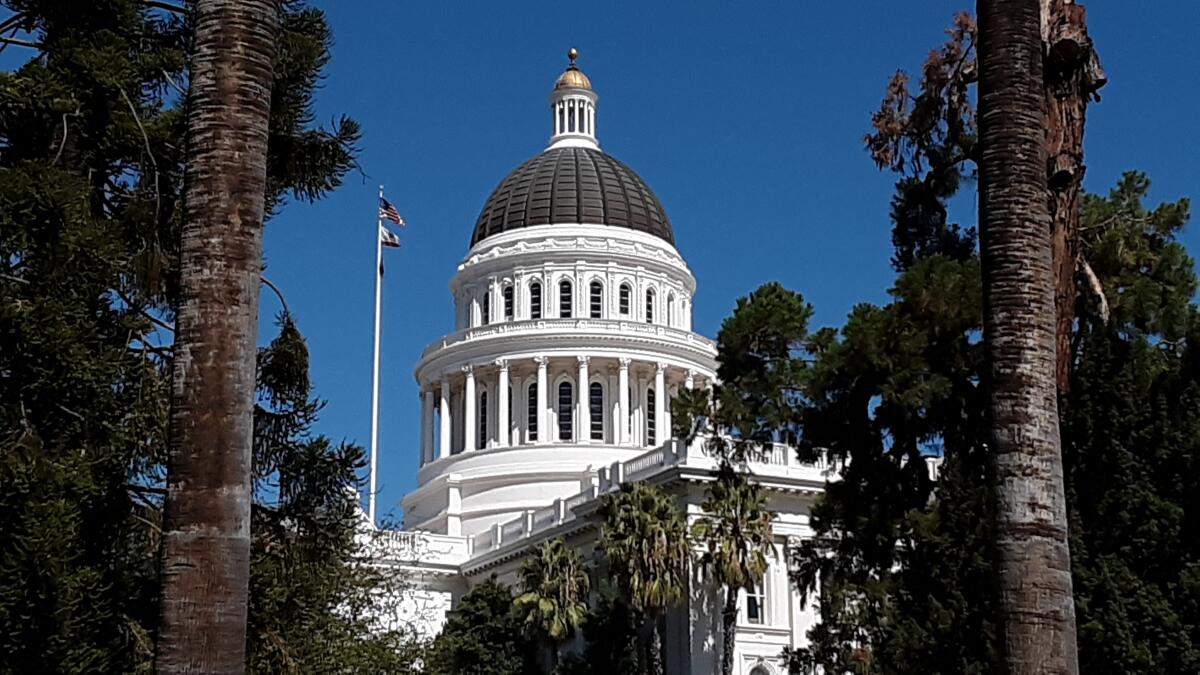California Politics: At legislative halftime, bills worth watching in Sacramento

Members of the California Legislature will take the Memorial Day holiday weekend to recover from long sessions in Sacramento this week to conclude the first half of their legislative business for the year.
The state Senate and Assembly are holding rare Friday floor sessions to finish their work on dozens of bills — in part, to ensure the Monday holiday doesn’t trigger a three-day recess that cuts into lawmakers’ per-diem salary supplements.
But Friday also marks the “house of origin” deadline, the date by which bills must clear their first legislative hurdles so that the process can begin all over again on the other side of the state Capitol. The legislative session ends on Aug. 31.
More than 2,000 proposed laws have been introduced by legislators this year, as well as a few dozen ceremonial resolutions and a few constitutional amendments. Most have already failed to advance and even many of the bills that will now swap places in the Senate and Assembly won’t make it to Gov. Gavin Newsom‘s desk.
At the halfway point, it’s worth a quick glance at some of the year’s more notable bills.
Strong odds on homelessness, guns, abortion
State Capitol watchers know to never underestimate the effect of outside events and powerful politicians in getting big policy changes enacted into law.
The last four weeks reshaped the Legislature’s focus for the year, a time span that began with the leak of a draft U.S. Supreme Court opinion that would upend abortion rights and stretched through Tuesday’s mass shooting at a Texas school, the nation’s third fatal shooting this month.
Leaning on their overwhelming legislative majority — 31 of 40 state senators, 58 of 80 Assembly members — Democrats and Newsom have promised action on several bills to burnish the state’s liberal reputation on both topics.
Senate Bill 1375 would allow nurse practitioners to work independently of doctors in offering abortion services, a proposal that cleared the Senate on Wednesday. That same day, senators sent Senate Bill 1142 to the Assembly, an effort to create a fund for private donations that could cover abortion services, including those sought by women traveling from other states.
A number of gun control bills were touted this week by Newsom and Democratic legislative leaders, with promises that some of them could become law before Jan. 1. The list includes Senate Bill 1327, a high-profile effort to give citizens the right to sue gun manufacturers, and Senate Bill 906, requiring school officials to investigate threats of a mass shooting and report their concerns to a law enforcement agency.
Less clear is the outcome of the year’s biggest bill on homelessness issues, one that follows Newsom’s promise for a civil court process to order mental health services for those with certain schizophrenia-related illnesses. Senate Bill 1338 was sent to the Assembly on Wednesday but with significant questions remaining about costs and the complexity of the new legal and behavioral health operations. Newsom is putting considerable political capital into the effort.
Six other bills to watch
Not every bill worth watching has received a lot of attention so far this year. Here are a half-dozen proposals that offer interesting policy debates in the weeks to come:
- Online violence threats: Senate Bill 1056 by state Sen. Tom Umberg (D-Orange) would require a social media platform to clearly display its policies regarding threatening messages and, if the company refuses to take down a menacing post, would allow a California resident to seek an injunction in court. The bill won votes from both sides of the aisle this week.
- Renters tax credit: Senate Bill 843 by state Sen. Steve Glazer (D-Orinda), approved Tuesday by the Senate, would increase the tax relief offered to renters — the first such boost in the program since 1979. Joint tax filers who now receive a small $120 tax credit would be eligible for as much as $1,000.
- Bridge toll debt: Assembly Bill 2594 by Assemblymember Phil Ting (D-San Francisco) would give drivers a chance to settle debts for bridge or roadway tolls before the fees and late fines become what Ting calls “crippling debt.” The bill was sent to the Senate on Wednesday.
- Showing salaries: Senate Bill 1162 by state Sen. Monique Limón (D-Goleta) would gradually expand requirements for some employers to reveal pay data, a change the bill’s supporters say would bring some fairness to wages paid to women and workers of color. The bill, sent to the Assembly on Tuesday, would require salary scales with job postings and would make public some pay information that employers already provide to state officials. Some of the changes would take place over the course of four years.
- Student activism: Senate Bill 955 by state Sen. Connie Leyva (D-Chino) would give middle and high school students one excused absence a year to participate in a civic or political event. That could include protests, town halls or other ways to engage with community issues.
- Wrong-way, freeway: Assembly Bill 1778 by Assemblymember Cristina Garcia (D-Bell Gardens) would link issues of environmental justice to the decision on where to expand or build new freeways. The metrics the bill would require state officials to use health-related social conditions — compiled as a score using the California Healthy Places Index — in deciding where to build. Parcels of land in communities with low scores could not be used for a variety of freeway enhancement projects. The bill was inspired by The Times’ investigation last year of freeway projects from across the country.
Enjoying this newsletter? Consider subscribing to the Los Angeles Times
Your support helps us deliver the news that matters most. Become a subscriber.
California politics lightning round
— Newsom signed a bill Monday to raise the amount of money that patients can receive in medical malpractice cases, increasing pain and suffering payments for the first time since lawmakers placed a cap on monetary damages nearly five decades ago.
— California could soon hold social media companies responsible for harming children who have become addicted to their products, permitting parents to sue platforms such as Instagram and TikTok for up to $25,000 per violation under a bill that passed the state Assembly.
— Six candidates have filed to run against state Supt. of Public Instruction Tony Thurmond for a four-year term as the leader of California schools in the June 7 primary. But none have the political advantages of the incumbent.
— What’s behind the mystery mailer on efforts to oppose banning single-use plastics? The mailer could be an attempt to derail a November state ballot measure.
Stay in touch
Did someone forward you this? Sign up here to get California Politics in your inbox.
Until next time, send your comments, suggestions and news tips to capolitics@latimes.com.
Sign up for Essential California
The most important California stories and recommendations in your inbox every morning.
You may occasionally receive promotional content from the Los Angeles Times.




